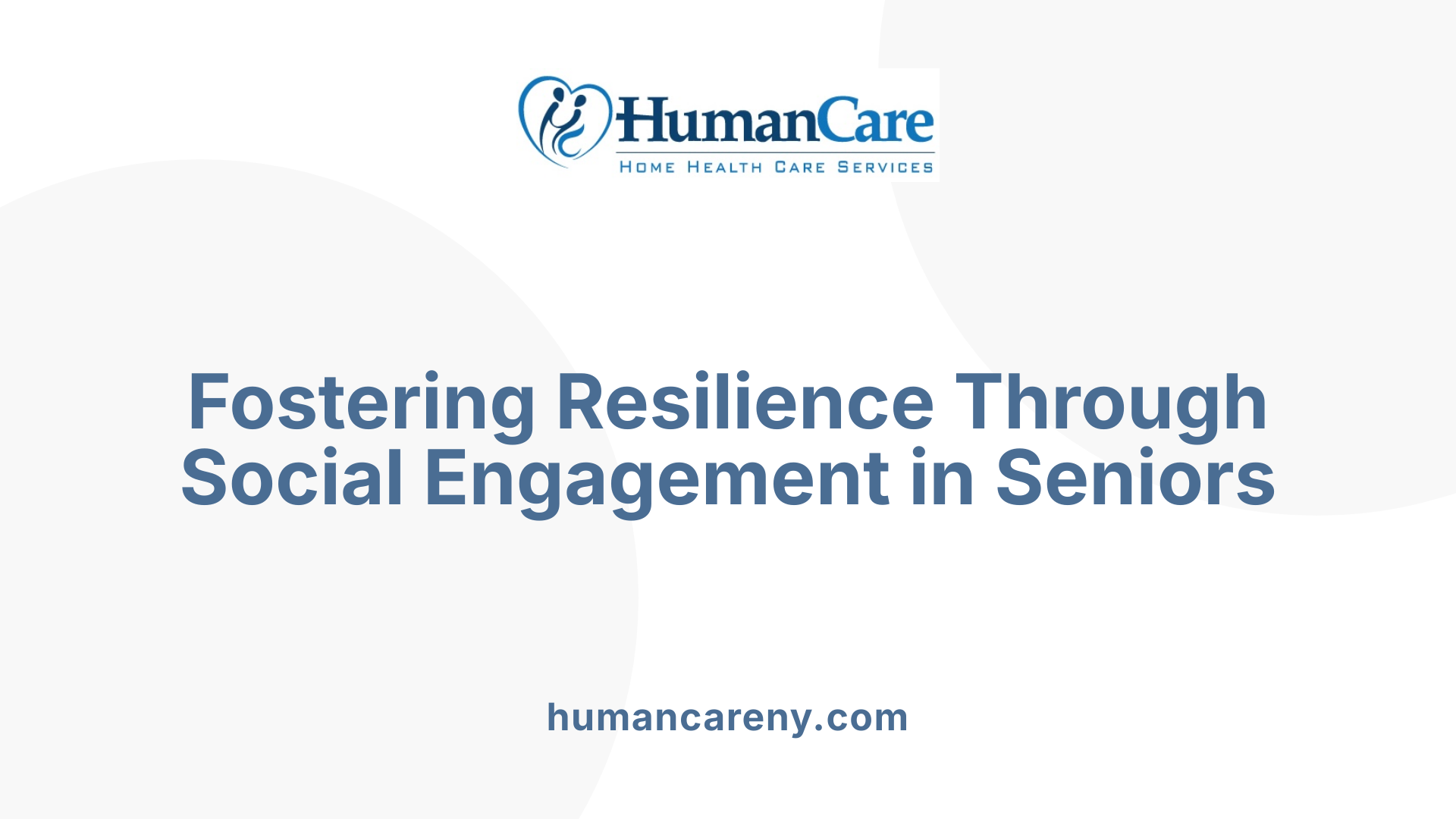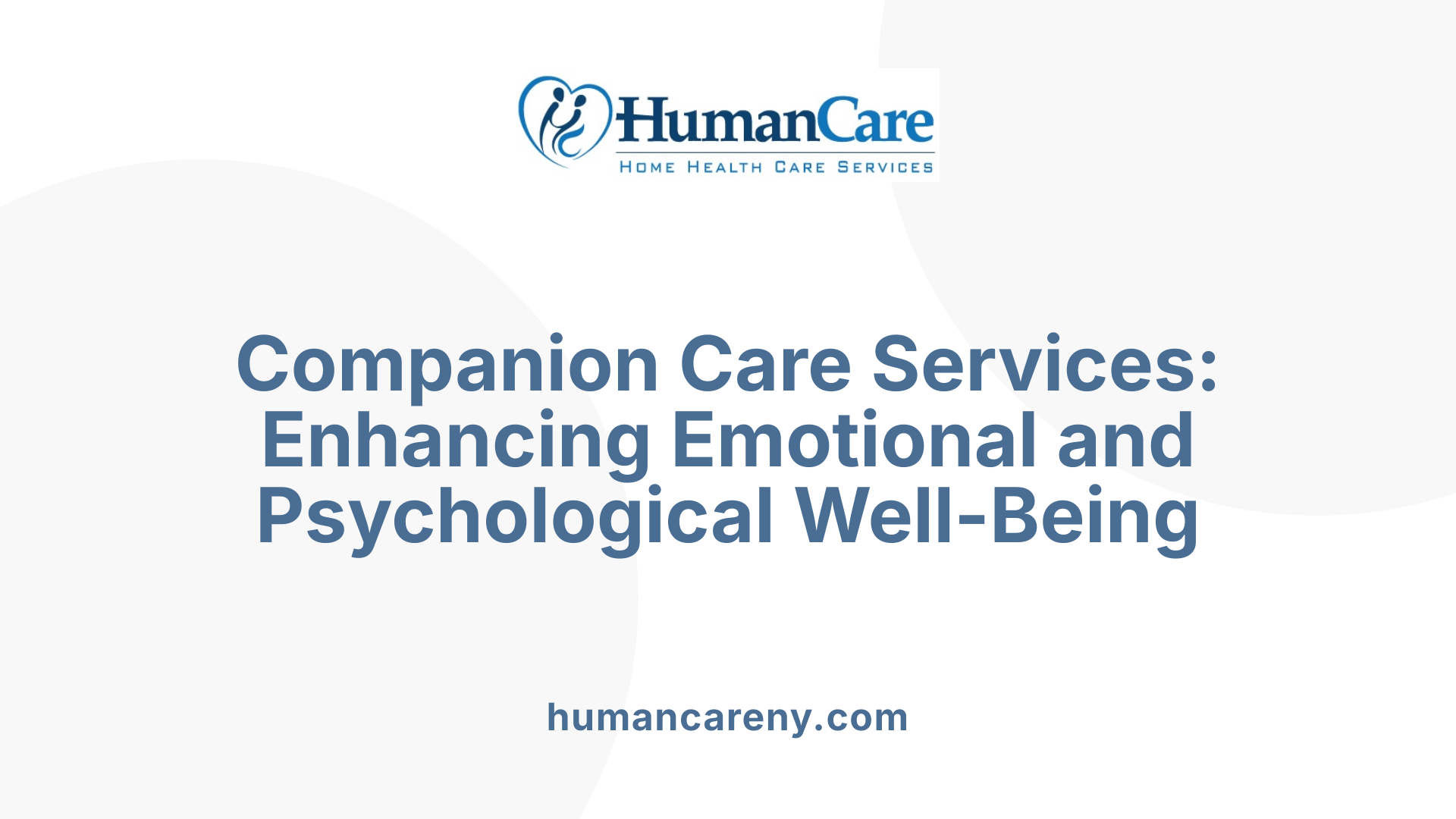Understanding the Critical Role of Emotional Support in Aging
As seniors grow older, emotional well-being becomes increasingly important for maintaining a high quality of life. Companion care services play a vital role in providing the social interactions, emotional support, and meaningful activities that help alleviate loneliness and foster mental health. This article explores how companionship enhances emotional resilience, promotes social engagement, and supports overall health for seniors, emphasizing the profound impact of relational care on their well-being.
The Significance of Emotional Support in Elder Care

Why is emotional support important in caregiving?
In senior care, emotional support plays a crucial role in enhancing overall well-being. Seniors often face social isolation, loneliness, and health challenges that can affect their mental health. Providing reassurance, encouragement, and comfort helps them feel valued, understood, and secure.
Companionship goes beyond physical assistance; it fosters trust, builds meaningful relationships, and creates a safe space for seniors to share their thoughts and feelings. When caregivers actively listen and engage in uplifting conversations, they contribute to reducing feelings of sadness, anxiety, and depression.
Moreover, emotional support encourages seniors to participate in daily activities, hobbies, and social events, which can boost mood and cognitive health. Regular social interactions help seniors reconnect with their environment, fostering a sense of purpose and belonging.
How providing reassurance and comfort can reduce loneliness and depression
Loneliness and depression are common among older adults and can lead to serious physical and mental health issues. The presence of a caring companion offers emotional stability and genuine companionship, alleviating feelings of social disconnection.
Supportive interactions, such as sharing stories, playing games, or simply listening, stimulate the senior’s mind and create moments of joy. These activities not only make today brighter but can also help delay cognitive decline.
Caregivers also help seniors cope with grief, health concerns, or life transitions by offering empathy and reassurance. This emotional shield can significantly reduce stress levels and improve mental health.
Providing consistent, compassionate support fosters resilience, encourages a positive outlook, and ultimately enhances the quality of life for seniors, allowing them to age with dignity, happiness, and a sense of connection.
The Impact of Companion Relationships on Emotional Well-Being

How meaningful relationships build trust and emotional bonds
Companion care fosters deep, trusting relationships between seniors and caregivers. These bonds are essential, as they make seniors feel valued, understood, and loved. When caregivers consistently show empathy and genuine interest, seniors develop a sense of safety and security. This emotional connection encourages seniors to open up about their thoughts and feelings, which significantly boosts their mood and self-esteem.
Building trust is further reinforced through personalized interactions. By understanding each senior’s unique preferences, interests, and life story, caregivers can tailor conversations and activities that resonate deeply. Such personalization fosters a sense of belonging and reinforces the emotional rapport between caregiver and senior, leading to better emotional health.
The role of regular visits and personalized interactions
Routine visits create stability and familiarity, which are vital for a senior’s emotional stability. Regular presence by caregivers ensures that seniors do not feel forgotten or isolated, addressing feelings of loneliness and social disconnection. These consistent interactions help senior individuals anticipate positive engagements, giving them something to look forward to each day.
Personalized engagement goes beyond mere companionship—it involves activities that reflect seniors' interests, such as hobbies, walks, or conversations about memorable events. This tailored approach not only improves their mental stimulation but also enhances their sense of purpose. When seniors feel understood and cared for on a personal level, their emotional well-being flourishes.
What emotional benefits can caregivers experience from caring for seniors?
Providing companionship can also bring emotional rewards to caregivers. Many experience a profound sense of purpose, personal growth, and fulfillment from their role. Building meaningful relationships boosts their self-esteem and offers a psychological sense of contributing to another’s happiness.
Caregivers often find working with seniors to be a source of joy and resilience, which can alleviate stress and foster emotional stability within themselves. Despite potential challenges, many caregivers acknowledge the positive impact of their efforts, noting feelings of satisfaction and connection that enhance their overall emotional health.
| Aspect | Benefit | Additional Details |
|---|---|---|
| Building trust | Fosters a sense of safety and emotional security | Encourages seniors to share freely |
| Regular visits | Creates stability and routine | Counters loneliness and social isolation |
| Personalized interactions | Enhances feelings of being valued and understood | Tailored to seniors' preferences |
| Caregiver emotional benefits | Increases sense of purpose and joy in caregiving | Promotes mutual emotional well-being |
In sum, strong caregiver-senior relationships built on trust, regularity, and personalization significantly boost emotional health. These relationships provide seniors with comfort, purpose, and belonging, while also enriching the emotional well-being of caregivers themselves.
The Mental and Emotional Rewards of Companion Care
How does companionship improve mental health and emotional well-being for seniors?
Companionship plays a vital role in enhancing the mental and emotional health of seniors. Regular social interactions with caregivers help reduce feelings of loneliness and social isolation, which are linked to higher risks of depression, anxiety, and cognitive decline. When seniors engage in conversations, games, and shared activities, they feel valued and connected, fostering a sense of purpose and belonging.
Building meaningful relationships with companions establishes trust and emotional bonds. These bonds provide emotional support during tough times, such as illness, loss of loved ones, or health worries. Companions offer a listening ear, reassurance, and understanding, helping seniors process their feelings and maintain emotional stability.
Furthermore, social engagement stimulates brain activity, supports cognitive health, and may delay or slow the progression of dementia. Participating in hobbies, community events, or simple walks with a friend keeps the mind active, which is crucial for overall well-being.
Studies indicate that interaction with caring companions releases endorphins—the body's natural feeling-good chemicals—boosting mood and resilience. This positive mental state encourages seniors to remain active and optimistic, significantly improving their happiness and outlook on life.
How consistent social interaction reduces feelings of loneliness.
This ongoing social contact ensures seniors do not feel forgotten or isolated, especially reminders of their importance in the community and family. Regular visits by caregivers establish routine contact, making seniors feel safe and appreciated. They also help seniors stay involved in social activities, hobbies, and community programs, which promotes ongoing engagement.
Even simple activities like sharing a meal, playing a game, or taking a walk can make a big difference. These moments provide moments of joy and connection, preventing the emotional toll that loneliness can exact. Consistency in these interactions fosters trust and emotional security, contributing to better mental health.
The importance of emotional support during challenging times.
Life can bring many emotional challenges for seniors—whether health issues, the death of loved ones, or personal fears. Having a trusted companion makes these difficult periods more manageable. Caregivers provide reassurance, empathy, and comfort, helping seniors process grief or stress.
This support also encourages openness, enabling seniors to express their feelings without shame or fear. Sharing worries with a compassionate caregiver can alleviate anxiety and promote emotional resilience.
Ultimately, companion care offers more than just social engagement—it is a pillar of emotional stability for seniors. The combination of meaningful interaction and empathetic support enriches their lives, cultivates happiness, and enhances overall mental health.
The Role of Social Engagement in Emotional Resilience

Why is social engagement important for seniors' emotional health?
For seniors, staying socially active is crucial for maintaining emotional well-being. Engaging in community activities, social visits, or hobbies allows older adults to feel supported, valued, and connected to others, which significantly reduces feelings of loneliness and isolation.
Studies show that seniors who participate in social interactions tend to experience better mental health, including lower levels of depression and anxiety. Social activities foster a sense of purpose and belonging, which boosts self-esteem and positive outlook on life.
Moreover, social engagement is linked to physical health benefits. It promotes better sleep, encourages physical activity like walking or gardening, and helps sustain cognitive functions—delaying the onset of dementia or cognitive decline.
By building and maintaining social networks, seniors create a safety net that offers emotional comfort during tough times, such as health issues or personal loss. Overall, social activities help enhance resilience, foster happiness, and support healthier, longer lives.
The link between social connection and longer, healthier lives
Research indicates that strong social ties are associated with increased longevity and improved overall health. Seniors with active social lives are more likely to experience higher survival rates, better immune function, and lower risks of chronic illnesses such as heart disease.
Regular social interaction stimulates the production of mood-enhancing chemicals like endorphins, which not only elevate mood but also support physical health. Social connectedness also reduces stress levels and helps seniors cope with everyday challenges more effectively.
Additionally, engaging in community events and group activities enhances mental agility and cognitive health. These interactions keep the brain active and may delay cognitive deterioration.
In summary, fostering social engagement isn’t just about mental health—it’s a vital component of healthy aging. By encouraging seniors to stay socially involved, families and caregivers help improve both the quality and quantity of their lives.
| Benefits of Social Engagement | Impact on Aging | Supporting Details |
|---|---|---|
| Reduced loneliness | Emotional health | Decreases feelings of isolation, depression, and anxiety |
| Improved physical health | Longevity and resistance | Promotes activity, better sleep, and immune function |
| Cognitive preservation | Brain health | Delays memory decline and cognitive impairment |
| Increased life satisfaction | Overall well-being | Provides purpose, joy, and social support |
Supporting Emotional and Psychological Well-Being Through Services

How do companion care services support seniors’ emotional and psychological well-being?
Companion care services play a vital role in improving seniors' emotional and mental health by providing consistent emotional support and social interaction. Regular visits from caregivers help reduce feelings of loneliness and social isolation, which are common among older adults and can lead to depression and anxiety.
Engaging seniors in activities such as conversations, hobbies, and outings promotes mental stimulation, which is essential for maintaining cognitive health. These activities foster a sense of purpose and belonging, helping seniors feel valued and appreciated.
Companion caregivers often build trusting relationships, offering a safe space for seniors to express their thoughts and feelings. This emotional connection helps seniors develop resilience and coping skills, particularly during tough times like health challenges or loss of loved ones.
Feeling cared for enhances self-esteem and provides comfort, contributing to a stable psychological state. The supportive environment created by companion care not only alleviates mental health issues but also encourages seniors to stay active and engaged with life.
In summary, companion care services support seniors’ emotional stability and psychological health through personalized attention, meaningful interactions, and encouraging participation in enriching activities, significantly boosting overall well-being.
The role of activities like hobbies, conversations, and outings
Activities such as hobbies, conversations, and community outings are integral to the emotional and mental health benefits of companion care. Engaging in hobbies like arts and crafts, music listening, or gardening helps stimulate the mind and evoke joyful memories.
Conversational engagement with caregivers nurtures self-esteem and provides a platform for seniors to share their experiences and feelings, fostering deeper connections and reducing loneliness.
Outings to parks, community centers, or events offer socialization opportunities, helping seniors re-establish ties with their surroundings and community. These outings encourage physical activity and mental engagement, which are crucial for preserving cognitive function.
Overall, these activities make seniors feel appreciated, connected, and purposeful, making a significant difference in their emotional health and enriching their daily lives.
Building a Supportive Environment for Seniors
Why is emotional support important in caregiving?
Providing emotional support is a crucial aspect of senior care. It helps older adults feel valued, secure, and understood, which can significantly boost their emotional well-being. When seniors receive reassurance and engaging companionship, feelings of loneliness and anxiety diminish.
A caring environment encourages trust between seniors and their caregivers. This trust fosters open communication, making it easier for seniors to express their needs and concerns. Activities like conversations, reminiscence, or shared hobbies can lift their mood and promote mental health.
Regular visits and personalized interactions create a sense of consistency and routine, further enhancing feelings of safety and stability. For seniors living alone or coping with health issues, these interactions serve as crucial emotional anchors.
In addition, emotional support helps seniors manage stress, grief, or fears related to health and loss. It also supports their independence and happiness by nurturing a sense of purpose and connection.
Ultimately, a nurturing and emotionally supportive environment not only improves seniors' quality of life but also supports caregivers in delivering compassionate, effective care.
Fostering Emotional Well-Being for a Better Quality of Life
The emotional benefits of companion care are foundational to promoting a richer, more engaged, and happier life for seniors. Through regular companionship, meaningful interactions, and supportive environments, these services help reduce loneliness, boost mood, and strengthen mental resilience. As seniors feel more valued and connected, their overall health and well-being improve, enabling them to enjoy their independence and pursue fulfilling activities. Supporting emotional health through compassionate care is not just an added feature but a vital component of holistic senior care, ensuring that loved ones age with dignity, purpose, and joy.
References
- The Emotional Benefits of Companion Care for Seniors
- How Companion Care Improves Emotional Well-Being in Seniors
- The Benefits of Companion Care for the Elderly - Right at Home
- Companion Care: Benefits for My Aging Senior - Rosarium Health
- Companion Care: Elevating Emotional Wellbeing for Seniors
- The Benefits of Companion Care for Seniors
- Companion Care Services & Their Benefits for the Elderly
- Benefits of Companion Care for Well-being
- What are the Psychological Benefits of Companion Care Services?
- Social and Emotional Benefits of Companion Care Services



